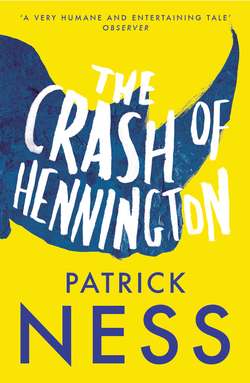Читать книгу The Crash of Hennington - Patrick Ness - Страница 13
5. Maggerty.
ОглавлениеMaggerty the Rhinoherd was not the rhinoherd, but the misnomer served a humane purpose. Though the resolute, quiet and massive Crash needed no tending, the presence of Maggerty could only otherwise be explained by madness, an explanation with which the polite citizens of Hennington privately agreed but publicly tended away. The Crash offered no product, neither meat nor milk nor leather; their eating patterns were too erratic and wandering to be a real benefit to agriculture (there were no farms in the city anyway, which was where The Crash wandered more than half the time); and the individual animals were impossible to tame, ignoring Henningtonians with a determination that would have seemed like arrogance had The Crash not also asked so little in return: a few hay bales during drier times and the right to free range. The Rhinoherd did nothing but follow. He was more disciple than caretaker. Hennington sensibilities to the side, it was an occupation for a fanatic or an imbecile. Fortunately, Maggerty was both.
He was born in the farmland to the south of Hennington, the only son of middle class rent-farmers. Odd from the beginning, his destiny was set at six years old when he was kicked between two ribs under his left armpit by a goat he tried to suckle. This – the attempted suckling – was not done out of hunger but out of simple entrancement with the goat and its wheaty, dirty, shitty goat-smell. Crawling past the small, electric dairy works; past the Rumour farm-maidens tending to the hens and the sheep; under the nose of the giant Rumour overseer asleep in his chair, head cocked towards a computer terminal, one hand somnolently gripping the erection that raged in his pants as he (the overseer) dreamed; moving quietly through the gate, held fast so the latch didn’t clatter; literally following his nose to the furthest pen, Maggerty came face to face with the bored she-goat, munching her hay, distracted and oblivious.
Trailing his fingers on the wall, Maggerty circled the goat slowly. She took no notice of him after her initial sizing-up, exuding the offhand confidence so peculiar to farm animals who weren’t also sheep. She was a greenish brown with white bony legs and sharp – Maggerty was soon to discover – hooves. With caution, or rather, with reverence Maggerty placed a hand on the goat’s hide. The goat jumped a little, but it seemed to Maggerty to be more out of surprise than abhorrence. When he touched her again, she didn’t move.
He began to stroke her, slowly, like a pet. She had birthed a litter less than three weeks before, but her kids had already been taken from her. Her udder, plump to the point of hardness, glistened with a liquid Maggerty assumed to be sweat. He knew, as all farm children knew, that udders issued milk, and he was deliriously overcome with a desire to drink, to sup rich sustenance from the goat, to bring the pulsing, thrumming warmth of another existing aliveness into himself. A contempt was there, too, for the goat’s refusal to regard him, to notice his need, but that did not stop his desire for the milk.
He knelt. Heat buzzed in the air. He felt his heartbeat in his temples. A tingling spread over his body along with a sort of ecstasy, if he had known the word at six, but it was like the ecstasy of those screaming streetcorner preachers who haunted Hennington’s desolate east side and who would shit right out in the open and leave it stinking in the sun for want of interrupting their sermons. Maggerty leaned in and put his lips to one of the long teats. He had not even properly gotten his mouth around the nipple when the goat kicked him, slicing a deep, precise cut between two ribs just below his left armpit, leaving a wound that never healed. Never.
This was the unacceptable thing. A child ridiculously exploring a goat could be explained, heaven knew such things and worse had happened on southern Hennington farms since time immemorial, but a child with a wound that never stopped bleeding, never scabbed nor scarred, now this was a thing to be wary of. The expected ostracism and isolation followed ruthlessly in the farming community, ringing outwards from friends to schoolmates to teachers and onward, until finally Maggerty’s own mother regarded him only grudgingly on the rare occasions when she regarded him at all.
As he stumbled down the road after The Crash, Maggerty distractedly put his hand to the wound. Years and years and years had passed. The wound never got worse, but it never got better either. It also never stopped hurting, and it was this, the never-ending pain coupled with the oddity of the never-healing wound, that had driven Maggerty irretrievably into madness sometime in the teenagedom when he had picked up with The Crash, still accompanying them all these many long years later.
He ate grass and roots with them. He drank from the streams and canals and lakes as they did. He rarely approached them – the experience with the goat had taught him not to meddle with an animal that weighed one hundred times as much – but he also never left them, nesting with them through winters and storms, famines and droughts. He began to be called Maggerty the Rhinoherd not long after taking up his patronage. At first, municipal thought considered forcibly separating him from The Crash, but as he apparently did no harm to the animals and as they did not seem to mind or indeed acknowledge his presence, he was left alone.
And so it stood. Maggerty the Rhinoherd. Before the year was out, he would have a second never-healing wound, but only because it would first take his life.
